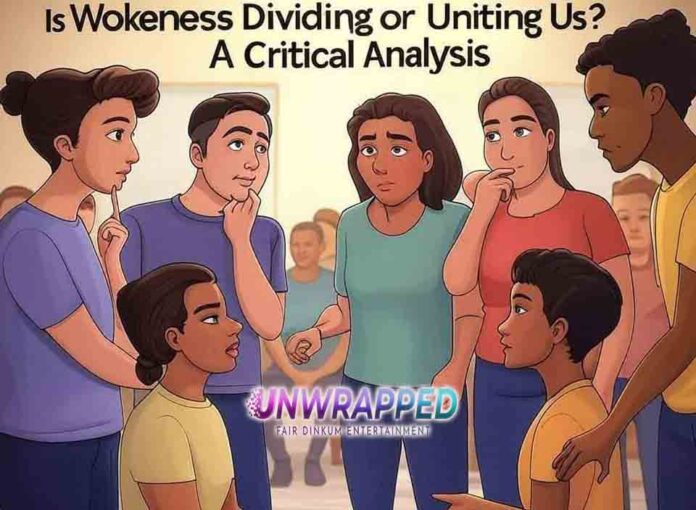In recent years, the term “wokeness” has become a prominent fixture in societal discourse, symbolizing an acute awareness of social injustices and a commitment to addressing systemic inequalities. Originating from African American Vernacular English, “stay woke” initially served as a cautionary reminder to remain vigilant against racial injustices. Today, its scope has broadened to encompass various social justice movements, including those advocating for gender equality, LGBTQ+ rights, and economic disparities.
As wokeness permeates mainstream culture, debates have emerged regarding its impact on societal cohesion. Proponents argue that wokeness fosters inclusivity and amplifies marginalized voices, thereby uniting diverse groups in the pursuit of equity. Critics, however, contend that an overemphasis on identity politics and cancel culture may exacerbate divisions and stifle open dialogue. This article delves into both perspectives, examining whether wokeness serves as a unifying force or a source of division in contemporary society.
The Unifying Potential of Wokeness
Amplifying Marginalized Voices
One of the primary objectives of wokeness is to bring attention to the experiences of historically marginalized communities. By highlighting systemic injustices, wokeness seeks to create a more equitable society where diverse voices are heard and valued. This amplification can lead to increased understanding and empathy among different social groups, fostering unity through shared awareness.
Promoting Social Justice and Equity
Wokeness advocates for proactive measures to dismantle systemic inequalities. Initiatives such as Diversity, Equity, and Inclusion (DEI) programs in workplaces and educational institutions aim to level the playing field for underrepresented groups. These efforts can cultivate environments where individuals from diverse backgrounds feel valued and included, thereby strengthening social cohesion.
Encouraging Active Citizenship
The rise of wokeness has coincided with increased civic engagement, particularly among younger generations. Awareness campaigns and social media movements have mobilized individuals to participate in protests, vote, and engage in community organizing. This surge in activism reflects a collective desire to address societal issues collaboratively, suggesting that wokeness can unite people in pursuit of common goals.
The Divisive Aspects of Wokeness
Identity Politics and Social Fragmentation
Critics argue that an intense focus on identity politics within woke culture can inadvertently reinforce divisions. By categorizing individuals primarily based on race, gender, or sexual orientation, there is a risk of overlooking shared human experiences that transcend these categories. This compartmentalization may lead to social fragmentation, as individuals identify more with their specific groups than with society at large.
The Rise of Cancel Culture
Cancel culture, a phenomenon often associated with wokeness, involves calling out and boycotting individuals or entities deemed to have committed social transgressions. While intended to hold parties accountable, this practice can suppress open dialogue and create an atmosphere of fear. The potential for public shaming may deter individuals from expressing differing viewpoints, hindering constructive conversations that are essential for societal progress.
Perceived Moral Superiority
Some detractors of wokeness perceive it as fostering a sense of moral superiority among its adherents. This perception can lead to alienation, as those who do not fully align with woke ideals may feel judged or ostracized. Such dynamics can create an “us versus them” mentality, further entrenching societal divisions rather than bridging them.
Balancing Awareness and Unity
Embracing Nuanced Discussions
To harness the unifying potential of wokeness while mitigating its divisive tendencies, it is crucial to promote nuanced discussions. Encouraging open dialogues that consider multiple perspectives can foster mutual understanding and reduce polarization. Creating spaces where individuals feel safe to express their views without fear of retribution is essential for meaningful progress.
Focusing on Common Goals
While acknowledging and addressing specific injustices is vital, emphasizing common goals can unite disparate groups. Collaborative efforts that highlight shared values and objectives can bridge divides and cultivate a sense of collective purpose. By working together on issues that impact all members of society, such as economic inequality or environmental sustainability, wokeness can serve as a catalyst for unity.
Avoiding Performative Activism
Performative activism, where individuals or organizations superficially engage with social justice issues to enhance their image, can undermine the credibility of wokeness. Genuine commitment to change requires sustained effort and introspection. By prioritizing authentic actions over symbolic gestures, the movement can maintain its integrity and foster genuine connections among diverse communities.
Conclusion
The discourse surrounding wokeness is multifaceted, encompassing both its potential to unite and divide society. While it amplifies marginalized voices and promotes social justice, challenges arise when identity politics and cancel culture lead to fragmentation and suppressed dialogue. Navigating this complex landscape necessitates a balanced approach that fosters inclusive conversations, emphasizes shared objectives, and prioritizes authentic engagement over performative acts.
Ultimately, the impact of wokeness on societal cohesion depends on how it is practiced and perceived. By striving for a more empathetic and collaborative approach, wokeness can transcend its divisive aspects and serve as a unifying force in the ongoing pursuit of equity and justice.
Call to Action
Engage thoughtfully in discussions about wokeness and its impact on society. Consider the following actions:
- Educate Yourself: Explore diverse perspectives on social justice issues to gain a comprehensive understanding.
- Participate in Open Dialogues: Engage in conversations that welcome differing viewpoints to foster mutual respect and learning.
- Support Inclusive Initiatives: Contribute to programs and organizations that promote genuine equity and inclusion.
- Reflect on Personal Biases: Examine your own beliefs and behaviors to identify areas for growth and understanding.
- Promote Empathy and Unity: Advocate for approaches that bridge divides and emphasize common humanity.
See Also: Most Woke Clothing Brand: Fashionable Finger-Wagging











